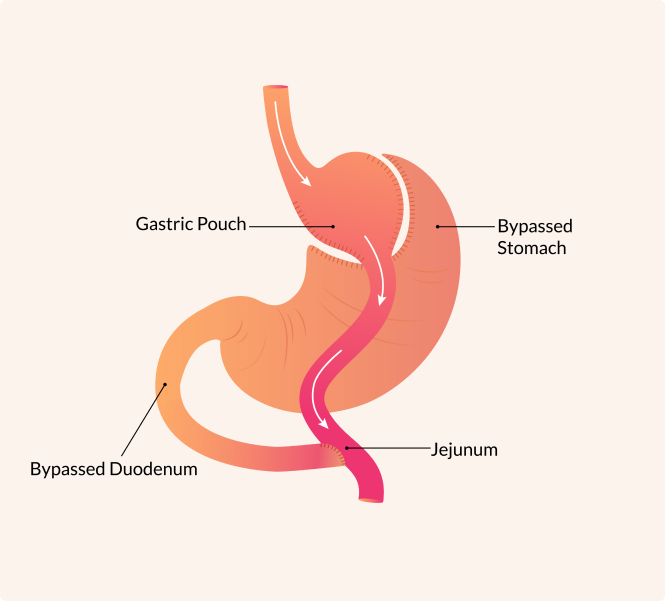How is Gastric Bypass performed?
Gastric bypass surgery, also known as Roux-en-Y gastric bypass, is a type of weight-loss procedure that involves both restrictive and malabsorptive components to help individuals achieve significant weight loss. This surgical procedure is often recommended for people with severe obesity who have not achieved success with other weight-loss methods.
Restrictive Component
- A small stomach pouch is created at the top of the stomach using staples or a vertical band.
- This smaller stomach pouch restricts the amount of food that can be consumed during a meal, leading to a feeling of fullness with smaller amounts of food.
Malabsorptive Component
- The small intestine is divided, and the lower portion is connected directly to the newly created stomach pouch.
- The upper portion of the divided small intestine is then reconnected to the lower portion further down, creating a “Y” shape.
- This rerouting of the small intestine limits the absorption of calories and nutrients, leading to malabsorption.
The combination of the smaller stomach pouch and the rerouted small intestine results in reduced food intake and decreased absorption of calories and nutrients. This dual mechanism contributes to significant weight loss. Gastric bypass surgery is performed using a laparoscopic approach, involving small incisions and the use of a camera and specialized instruments. This minimally invasive technique often results in a faster recovery compared to traditional open surgery add period at the end.

Benefits
Why Bypass Surgery?
- Significant Weight Loss: Gastric bypass surgery has been shown to result in substantial and sustained weight loss in many individuals.Improvement of Obesity.
- Resolution of co-morbidities: Many individuals experience improvements or remission of obesity-related conditions such as type 2 diabetes, hypertension, and sleep apnea.
- Enhanced Quality of Life: Weight loss achieved through gastric bypass surgery often leads to improvements in mobility, energy levels, and overall well-being.
It’s important to note that gastric bypass surgery is a major procedure and is generally reserved for individuals with a Body Mass Index (BMI) of 40 or higher or a BMI of 35 or higher with obesity-related health conditions. As with any surgical procedure, gastric bypass surgery carries potential risks and requires a commitment to postoperative lifestyle changes, including dietary modifications and regular physical activity.
“I never thought long-term weight loss was possible after struggling with obesity my entire life, until I found Idaho BMI. Dr. Brown, the staff, dietitian, all of it surpassed my expectations.”
“The only regret I have is not doing this 20 years ago. I’m in the best shape of my life and more importantly, I’m not longer on diabetes or blood pressure meds. Don’t wait another day to make this change!”
We operate differently.
About Idaho BMI
Idaho BMI, in partnership with Everest Surgical Institute, is committed to making bariatric surgery available to more people who need it. Because no one should ever be priced out of reaching their fullest potential.

Reprogram your brain. Redefine your future.
Ready to shed more than just doubts? Inquire now to request an appointment and discover the path to better health.

